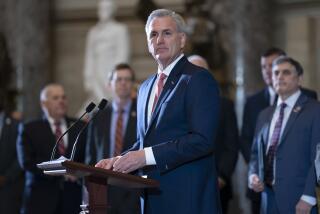Aide at Center of the Controversy
- Share via
WASHINGTON — As the world collapsed around former Rep. Mark Foley, he looked for advice from a friend who knew him better than anyone else in the Capitol: his longtime chief of staff Kirk Fordham.
The upstate New York native had run Foley’s first campaign for Congress in 1994. He remained loyal three years ago as Foley abandoned his ambitions of winning a Senate seat amid reports that he was gay. And Fordham looked out for Foley as the congressman led an active social life around Capitol Hill, trying to make sure his boss’ activities did not lead to politically harmful speculation.
But today, Fordham is at the center of questions over whether Republican leaders should have known more about Foley’s behavior before the revelation broke last week that Foley was sending sexually explicit messages to teenage boys.
Fordham, 39, is now chief of staff to one of the most powerful Republicans in the House, Rep. Thomas M. Reynolds, who as chairman of the National Republican Congressional Committee is in charge of helping the GOP retain its majority -- a goal that has been placed further in jeopardy by the Foley scandal.
Fordham left Foley’s office in 2004, but on Friday he joined in a conversation at the congressman’s Capitol Hill town house advising Foley to resign.
Fordham counseled his former boss as the story began breaking last week -- first with a report of an e-mail in which the congressman had asked a former House page for his picture and then with the more explicit instant messages that followed. He asked an ABC News reporter to not publish the messages, a protective role Fordham had performed for years as he sought to prevent mainstream media reports about his ambitious boss’ sexual orientation.
Democrats charge that Fordham’s involvement reflected the GOP’s desire to minimize the political fallout by, at least initially, keeping the issue quiet.
Reynolds, who is locked in a tight reelection battle for his own upstate New York seat, was forced to address his aide’s role on Tuesday, telling reporters that Fordham acted without his knowledge. He said he didn’t discuss the Foley matter with Fordham until Friday.
“I didn’t give him permission to have any conversations that he’s had at any time with Mark Foley, either as his friend or as his former employer,” said Reynolds, adding that Fordham was interacting with Foley on his own time.
Reynolds has said that he first alerted House Speaker J. Dennis Hastert last spring to an “overly friendly” e-mail that had been sent by Foley to a teenager. But he did not know about the more explicit instant messages until they were reported last week, he said.
Fordham, who worked on the 2004 campaign of Sen. Mel Martinez (R-Fla.) before working as a private consultant and then joining Reynolds’ office, retained a lawyer on Tuesday and said that he intended to cooperate with the FBI’s investigation of Foley’s behavior.
Speaking on the advice of his lawyer only to the Associated Press and to an upstate New York newspaper, Fordham said Tuesday that he confronted Foley on Friday about the sexually explicit messages.
“I said, ‘Are these authentic?’ and he said, ‘Probably,’ and he confirmed that they were likely his instant messages,” Fordham told AP.
Fordham said that Reynolds instructed him to tell Foley that he needed to resign.
The NRCC wrote Foley’s resignation letter, which was transferred to Foley’s stationery and signed by the congressman during a gathering at his house that included Fordham and Foley’s sister, who has been his closest friend and political advisor.
“I was still pretty shellshocked myself,” Fordham told AP. “This was someone I had worked for for 10 years. I had no inkling that this kind of blatantly reckless -- just obscene -- behavior was going on behind our backs.”
Fordham added that, until last week, he had never spoken with Reynolds about any potential problems involving Foley and that Reynolds did not ask him about the Foley e-mail last spring.
Fordham’s lawyer, former federal prosecutor Tim Heaphy, said Tuesday that Fordham would be forthcoming when investigators interviewed him about Foley.
The aide’s attempt to ask ABC not to publish or air the instant messages was not an effort to withhold the information from law enforcement, Heaphy said.
“It was never an attempt to obstruct justice,” Heaphy said. “It was an attempt to shield his boss from the political storm.”
*
noam.levey@latimes.com
*
Times staff writer Deborah Schoch in Los Angeles contributed to this report.
More to Read
Get the L.A. Times Politics newsletter
Deeply reported insights into legislation, politics and policy from Sacramento, Washington and beyond. In your inbox twice per week.
You may occasionally receive promotional content from the Los Angeles Times.











